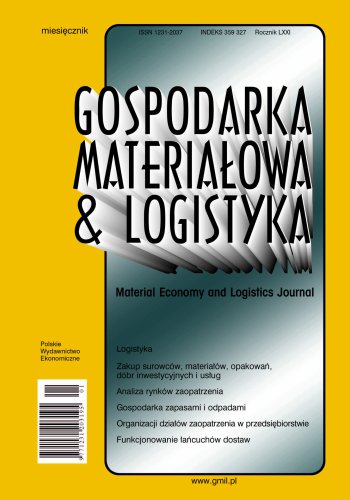Logistyka tłumu — nowe zjawisko w gospodarce współdzielenia
Celem artykułu jest próba identyfikacji stosunkowo nowego zjawiska w gospodarce współdzielenia, jakim jest logistyka tłumu (crowd logistics). Pomimo coraz większej popularności, inicjatywy tego typu nie są jeszcze przedmiotem wielu prac naukowych, relatywnie niewiele artykułów porusza tę problematykę. Istotą logistyki tłumu jest stworzenie połączenia pomiędzy uczestnikami gry rynkowej posiadającymi określone zasoby logistyczne a tymi, którzy zgłaszają potrzeby logistyczne. Ma to zmierzać do zminimalizowania nieefektywnej eksploatacji zasobów i zaktywizowania niewykorzystywanych kompetencji. Wykorzystując podejście eksploracyjne, na podstawie wyników przeglądu 77 aktywnych inicjatyw logistyki tłumu zbadano rozwiązania stosowane w praktyce. Dokonano podziału tych inicjatyw na grupy zdefiniowane w niniejszym artykule, a także podkreślono główne charakterystyczne cechy logistyki tłumu w porównaniu z tradycyjną logistyką biznesową. Dokonano także próby określenia kierunków rozwoju i potencjalnego wpływu logistyki tłumu na tradycyjne przedsiębiorstwa. Praca powstała na bazie analizy materiałów wtórnych: artykułów, raportów firm konsultingowych i studiów przypadków dostępnych w czasopismach branżowych, na firmowych stronach internetowych oraz przedstawianych przez same firmy w ramach seminariów internetowych.
Bibliografia
Bibliografia/References
Baroin, D., Huet, J.-M., & Rouquet, A. (2019). La crowd logistics ou l'économie collaborative face au défi du dernier kilometer. Harvard Business Review France, https://www.hbrfrance.fr/chroniques-experts/2019/02/24259-la-crowd-logistics-ou-leconomiecollaborative-face-au-defi-du-dernier-kilometre (dostęp: 20.01.2022).
Belleflamme, P., Lambert, T., & Schwienbacher, A. (2014). Crowdfunding: Tapping the right crowd. Journal of Business Venturing, 29(5), 585–609.
Bellingkrodt, S., & Wallenburg, C. M. (2013). The role of external relationships for LSP innovativeness: A contingency approach. Journal of Business Logistics, 34(3), 209–221.
Botsman, R. (2014). Collaborative logistics. Ripe for disruption. http://www.collaborativeconsumption.com/2014/10/08/collaborativelogistics-ripe-for-disruption/ (dostęp: 20.01.2022).
Boudreau, K. J., & Lakhani, K. R. (2013). Using the crowd as an innovation partner. Harvard Business Review, 91(4), 60–69.
Carbone, V., Rouquet, A., & Roussat, C. (2018). Understanding crowd logistics. CSCMP's Supply Chain Quarterly, https://www.supplychainquarterly.com/articles/20180301-understanding-crowd-logistics (dostęp: 20.01.2022).
Carson, B. (2018). Instacart grabs extra $600M in funding at $7.6B valuation, says IPO 'on the horizon'. Forbes, https://www.forbes.com/sites/bizcarson/2018/10/16/instacart-600-million-ipo-plans/?sh=6b3646eb4172 (dostęp: 20.01.2022).
Chen, C., Cheng, S. F., Gunawan, A., Misra, A., Dasgupta, K., & Chander, D. (2014). TRACCS: Trajectory-aware coordinated urban crowd-sourcing. Second AAAI Conference on Human Computation and Crowdsourcing (HCOMP-14).
Collm, A., & Schedler, K. (2012). Managing crowd innovation in public administration. International Public Management Review, 13(2), 1–18.
Cox, A., Ireland, P., Lonsdale, C., Sanderson, J., & Watson, G. (2003). Supply chains, markets and power: Managing buyer and supplier power regimes. SUNY Press.
Erving, E. E. (2014). The sharing economy: Exploring the intersection of collaborative consumption and capitalism. Scripps senior theses. Paper 409. http://scholarship.claremont.edu/scripps_theses/409 (dostęp: 20.01.2022).
Estellés-Arolas, E., & González-Ladrón-de-Guevara, F. (2012). Towards an integrated crowdsourcing definition. Journal of Information Science, 38(2), 189–200.
Franklin, J. (2020). Exclusive: Instacart taps Goldman Sachs to lead IPO at $30 billion valuation — sources. Reuters, https://www.reuters.com/article/us-instacart-ipo-exclusive-idUSKBN27S3AG, (dostęp: 20.01.2022).
Gansky, L. (2010). The mesh: Why the future of business is sharing. Portfolio/Penguin.
Hawksworth, J., & Vaughan, R. (2015). The sharing economy. Sizing the revenue opportunity, issues/megatrends/collision. http://www.pwc.co.uk/issues/megatrends/collisions/sharingeconomy/the-sharing-economy-sizing-the-revenue-opportunity (dostęp: 20.01.2022).
Howe, J. (2006). The rise of crowdsourcing. Wired, http://www.wired.com/wired/archive/14.06/crowds.html, (dostęp: 20.01.2022).
Hubner, A. H., Kuhn, H., & Wollenburg, J. (2016). Last-mile fulfilment and distribution in omni-channel grocery retailing: A strategic planning framework. International Journal of Retail and Distribution Management, 44(3), 228–247.
INSEE. (2021). Créations d'entreprises et d'établissements de 2011 a 2020 et stocks d'unités légales et d'établissements au 31 décembre 2018. L'Institut national de la statistique et des études économiques, https://www.insee.fr/fr/statistiques/2021271 (dostęp: 20.01.2022).
Ketokivi, M., & Choi, T. (2014). Renaissance of case research as a scientific method. Journal of Operations Management, 32(5), 232–240.
Libert, B., Wind, Y., & Beck, M. (2014). What Airbnb, Uber, and Alibaba have in common. 20.11.2014. https://hbr.org/2014/11/whatairbnb-uber-and-alibaba-have-in-common (dostęp: 20.01.2022).
Mehmann, J., Frehe, V., & Teuteberg, F. (2015). Crowd logistics — a literature review and maturity model. W: W. Kersten, T. Blecker, & C. M. Ringler (red.), Proceedings of the Hamburg International Conference on Logistics (HCL). Innovations and strategies for logistics and supply chains (117–145). Technische Universität Hamburg.
Mladenow, A., Bauer, C., & Strauss, C. (2015). Crowdsourcing in logistics: Concepts and applications using the social crowd. W: M. Indrawan-Santiago, M. Steinbauer, I. Khalil, G. Anderst-Kotsis (red.), ICPS — International Conference Proceedings Series (244–251).
Ordanini, A., Miceli, L., Pizzetti, M., & Parasuraman, A. (2011). Crowd-funding: Transforming customers into investors through innovative service platforms. Journal of Service Management, 22(4), 443–470.
Owyang, J., & Samuel, A. (2015). The new rules of the collaborative economy. Crowd companies & vision critical. https://www.visioncritical.com/resources/new-rulescollaborative-economy (dostęp: 20.01.2022).
Paché, G. (2020). La crowd logistics en danger. Management & Data Science, 4(4).
Persson, G., & Virum, H. (2001). Growth Strategies for Logistics Service Providers: A Case Study. The International Journal of Logistics Management, 12(1), 53–64.
Rouquet, A., & Paché, G. (2020). Logistique de magasinage en distribution alimentaire: une approche fictionnelle relative a l'usage du smartphone. Logistique & Management, 28(3–4), 210–223. https://doi.org/10.1080/12507970.2020.1730253
Rześny-Cieplińska, J. (2019). Crowd logistics-concept and application possibilities in Polish cities. Studia Ekonomiczne, 383, 20–30.
Simon, E. (2007). La confiance dans tous ses états. Revue Française de Gestion, 175, 83–94.
Slee, T. (2015). What's yours is mine: Against the sharing economy. OR Books.
Schenk, E., & Guittard, C. (2011). Towards a characterization of crowdsourcing practices. Journal of Innovation Economics & Management, (7), 93–107.
Schor, J. (2014). Debating the Sharing Economy. Great Transition Initiatives. http://www.greattransition.org/publication/debatingthe-sharing-economy (dostęp: 20.01.2022).
Top crowd logistics companies. https://www.ventureradar.com/keyword/crowd%20logistics, (dostęp: 20.01.2022).
Yang, Y., & Yuan, Q. (2018). Crowdsourced freight delivery: Value created via logistics platform. Working Paper, School of Business, Economics & Law, University of Gothenburg.
Zervas, G., Proserpio, D., & Byers, J. (2014). The rise of the sharing economy: Estimating the impact of Airbnb on the hotel industry. Boston University School of Management Research. Paper Series: 2013–16.

